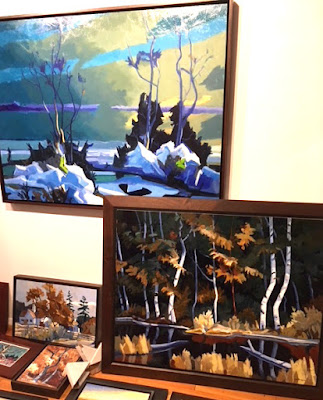Win a Philip Koch Oil Painting & Support a Great Museum
Here I am yesterday with Jennifer Chapman Smith who's Curator at the Washington County Museum of Fine Arts in Hagerstown, Maryland. We're standing beside my oil Beneath the Pine. Jennifer had just installed the it in the Museum's lobby where it will be on view for the next two months.
The Museum is giving it away as one of their featured prizes in its Annual Museum Raffle on Jan. 30, 2011. For a $10 ticket you have a chance to win the painting, a $5000 Shopping Spree at R. Bruce Carson Jewelers, one week at a vacation cottage on Cape Cod, or one of a bunch of other goodies. And you get to support one of America's coolest regional art museums. Here's a link to WCMFA's website where you can buy tickets on line (you don't have to be present at the Jan. 30 ticket drawing to win).
Here's a better view of painting.

The painting was done out on location with my trusty portable easel in the Mount Washington neighborhood in northwest Baltimore. It's a view I discovered on my old jogging route on Dixon Road, about a quarter mile from my studio. It's a hilly, forested area that attracted me by its similarity to where I grew up in upstate New York.
The houses were originally built early in the last century by wealthy Baltimoreans as summer homes to escape the heat and industry of the nearby city. Now just regular people live in them. The trees have grown back and this particular house had a marvelously overgrown tree dominating its front yard.
There's a wonderful convention painters have used for centuries of placing the viewer in one spot and inviting them to peer over into an adjoining space. Usually it helps to change the color of the light as you move from one space to another. I've made full use of that device here. We're in a cool dark shadow looking though the barrier-like tree to a lighter golden light on the white house.
There's a psychology to presenting contrasting spaces like this. Think how often we leave our present moment to recall a meaningful past event or just to imagine a different condition than the one we're in right now. The imagination is something that travels. Landscape painting's enduring mission is weave together spaces to give the viewer a resonantly poetic journey. I like to think of a painting as a mental springboard that gives some extra height and distance to the wanderings of our emotions.
Most of all in the painting I liked the pine tree. It was huge and its heavy limbs drooped under their own weight. The tree is almost all diagonals and I selected for special emphasis the ones that echoed the slope of the hillside. Notice how in the upper right corner the line of the roof runs exactly parallel with those diagonal limbs and the sloping ground. When I was beginning the painting I had positioned my easel in just the right spot to make that happen.
Writing this post this morning I got curious to see the house and tree again (it's been years since I looked at them). So I ran down the hill with my camera to take a look. As you can see there's been some changes.
Today is pretty cloudy and my painting was dependent on a bright shining sun to provide its drama. And someone has seriously cut back the tree so it no longer blocks the light the way it did in the painting. While they were at it they took out a whole line of shrubbery too. The white house in the distance has changed its colors too, now opting for light blue grey siding and blue shutters. I had loved the cherry reds in the older shutters. Were I painting it again today I think I'd lie and change them back to red.
In a way I find these changes a tiny bit upsetting. When you make a painting you have to get passionately involved with your idea or it won't work. And once that passion has cooled with time I discover I want things to stay completely unchanged, waiting for my return. Obviously that's not going to happen. At least we have the painting to stoke our memories.




